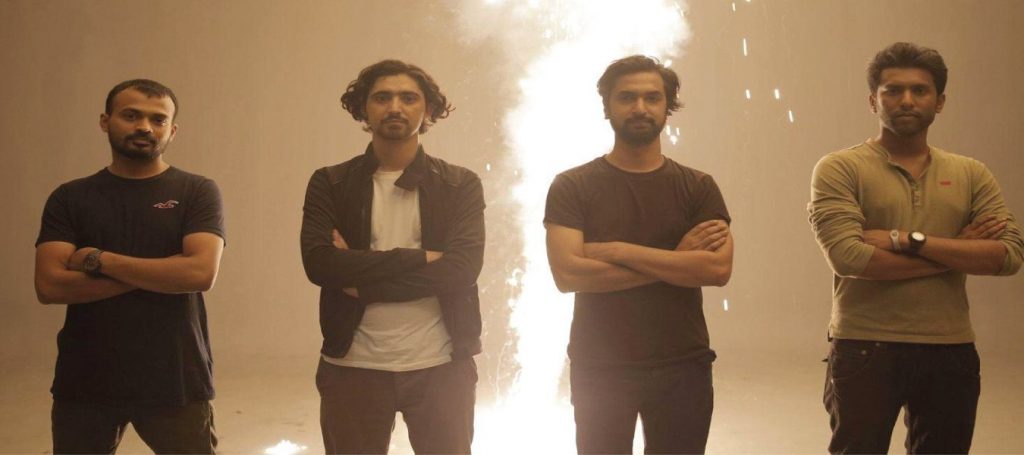A few years after listening to Parvaaz, one comes upon many metaphors to describe their music. If one is feeling particularly heartbroken, their discography can appear as a repertoire of emotions that you were not prepared for.
How does one make such a point? By listing four songs that demonstrate it with startling yet obvious flourish.
Roz Roz: Reviewing Parvaaz is difficult, as the band embraces the heartrending argot of Kashmiri-kissed Urdu with flecks of Hindi. Nonetheless, a subconscious constructed out of exposure to Gulzar (as is the case for most Indians) knows that they are singing of profound truths and agonies. Especially in this one.
A translation will reveal the truth to this.
Roz roz boz myaein zaar madno ( Stay, listen to my torment, my beloved)
Daadiy chaaniy rowum aaram madno ( I’ve lost all my peace with your affliction)
Tchiy ha tchiy chuk balgaar madno ( You are the wrap to the wounds)
Chaaniy pattae rowum laukchaar madno ( I’ve lost my youth after you, my beloved)
Source: http://upasnakakroo.co/in-conversation-with-parvaaz-talking-about-baran/
If vocalist Khalid Ahamed was residing in old Greece, he would have been feared and desired as one of the sirens, enchanting sailors to their doom with mellifluous meanderings. He transforms verses by Kahmiri poet Mahjoor into an echo chamber for (tragically) the heart of all existence – longing. We do admit that we do not possess the words that may match the despairing resonance. All that does this song any justice is your attention to its quiet provocation.
Gul Gulshan: Wherever possible, a translation is the easiest instrument for revealing magic. Also drawn from the poet Majhoor:
Walo ha Baagwano (Come forth, Gardener)
Nov bahaaruk shaan paida kar (Create the magnificence of a new spring)
Pholan Gul gath karan Bulbul (The flowers would bloom, with songbirds circling around them )
Tithuy saamaan paida kar (Create things like that )
Chaman varaan, wadaan shabnam (The Garden is desolate, the dew weeps )
Tchatith jamae, pareshaan Gul (With torn robes, the flowers are distraught…)
Gulan tay bul gulan andar, dubaray jaan paida kar ( Inside those lifeless flowers and songbirds, create a new life again)
Source: http://upasnakakroo.co/in-conversation-with-parvaaz-talking-about-baran/
Hope and blight tussle in blind compulsion and the music evokes unity with memory and history that you can’t specify but feel irrevocably imbued with. Every song they ever made denotes that Parvaaz taps into the strangeness and distress of old souls that cannot sleep. Gul Gulshan is no exception. The invocation to the nameless gardener is set in gospel tones, and drives you to pour your prayers while the music soars.
Itne Arsay Ke Baad: Home is not a place. Home is sentiment, memory, safety and assurance. For far too many, home exists outside their childhood, in places where they found refuge from adolescent loneliness.
For Parvaaz, however, home is where they emerged from. Guitarist Kashif Iqbal and Khaled Ahamed give form to a viscous mass of nostalgia. They lament separation from Kashmir – not just the landmass embodying a turbulent paradise, but the cultural signatures that informed their lives. As is characteristic of them, they create a piece that reverberates with overt, exceptional loss.
“Kab tak aise jiyein, kab tak haske sahein. Duniya ke sara nasha, kab tak aise piyein”
Ghaib: This one drips into your consciousness via languishing questions.
Ye khauf kya, ye bair kya (What is this fear, what is this hatred?)
Gar tu jaza, to maut kya ( If you are the reward, then what is death?)
Israar jo, hai kaifiya ( If there is persistence on happiness)
Khamosh kyun, ohohoho ( Why this silence?)
Source: https://www.musixmatch.com/lyrics/Parvaaz/Ghaib/translation/english
Questions niggle at all your conceptions. You’re not sure what they are addressing, but you are convinced that you must listen. Nestled in gentle, seductive melody, the song draws attention to everything you should be asking of yourself and of the world. Imagine a song that brings to light all the 3 am thoughts that you have been repressing all day, all your life because you are afraid that you have no answers.
That is Ghaib.








